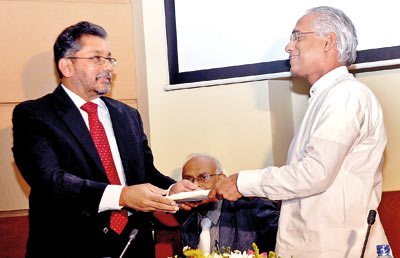SL economist stresses need for another IMF financial package to avert a budgetary crisis
Sri Lanka urgently needs another financial package from the International Monetary Fund (IMF) like the bailout package in 2009 to overcome the present budgetary crisis, an eminent economist emphasised.
The country’s economy was facing the same structural problems which it had, several years ago with problems like a weakened institutional structure, lack of governance, non-observance of economic policy governance and rule of law, former Central Bank Deputy Governor W.A. Wijewardena said in Colombo Tuesday.

Dr Saman Kelegama and Deputy Minister Eran Wickramaratne
Addressing the launch of the 23rd annual publication ‘Sri Lanka State of the Economy 2015′ by Institute of Policy Studies (IPS), Mr Wijewardena noted that Sri Lanka’s macroeconomic fundamentals have worsened this year.
The trade deficit is increasing, foreign reserves are depleting, the balance of payments is deteriorating and global conditions, except the drop in international fuel prices, are not favourable at present, he warned.
Government expenditure was rising without commensurate increases in revenue.
The increasing fiscal deficit, public debt and trade deficit are closely connected and arise from the fiscal deficit to a large extent, he pointed out.
The crisis came about as the country defended the rupee and later floated it believing it was vulnerable due to poor economic fundamentals in the country, which did not justify its exchange rate.
The economy had seen massive overspending in previous years with levels of debt skyrocketing, he opined.
This situation had been properly analysed in the ‘Sri Lanka State of the Economy 2015′, he said praising the IPS for its bold efforts to highlight the correct picture of the economy over the years.
Mr. Wijewardena further noted that Sri Lanka is facing a similar economic situation which was experienced by Thailand during 1997-98.
Being depleted of its foreign currency reserve in attempts to fight against the speculative forces, on July 2, 1997, Thailand decided to switch to a flexible exchange rate regime.
The Thai baht was depreciated by more than 50 per cent by the end of that year the Thais had experienced a collapse of their economy for the first time.
Thailand’s volume of exports decreased, contributing to a balance of trade deficit, he disclosed.
A former adviser to a Thai bank had been sentenced to 10 years in prison and ordered to pay US$41 million in fines and compensation recently for embezzlement that helped spark the 1997 financial crisis, he revealed.
Mr. Wijewardena emphasised the need of introducing prompt corrective measures in the 2016 budget that will be presented in parliament next month.
Meanwhile Deputy Minister of State Enterprises Development Eran Wickramaratne, speaking at the event, said that Sri Lanka’s new government is facing several internal and external challenges due to a deteriorating economy passed on to it by the previous regime and it will take some time to adjust policy and economic reforms on par with managing politics.
“The country is facing a twin deficit, a current account deficit as well as budgetary deficit, we have hard choices to make particularly as we face these deficit, we have to think very hard on what we are going to do particularly in areas like export policy, on what government role is going to be, and the government intervention it will really require,” he said.
He noted that a longer period is needed to implement these adjustments and it will be a challenge in managing the political economy. Sri Lanka’s export share of gross domestic product has dropped to less than 15 per cent, as the newly released IPS report has revealed.
Dr. Saman Kelegama , Executive Director, IPS pointed out that Sri Lanka’s fiscal constraints, the demographics of a contracting labour and skill deficiencies suggest that a rise in infrastructure investment will spur growth only temporarily.
Sustaining higher growth in the long run must come via a competitive export sector through improvements in productivity, notably due to innovation and to investments in human capital, he added.


